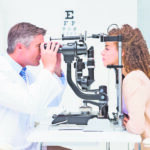
The retina plays a crucial role in your visual system. Positioned at the back of your eye, it consists of a layer of tissue that detects light and transmits visual signals to your brain. Any harm or degeneration of the retina can lead to various ocular conditions, including diabetic retinopathy, macular degeneration, and nearsightedness.
Fortunately, there are numerous daily practices you can adopt to promote the well-being of your eyes and maintain strong vision. Continue reading to discover effective ways to enhance the health of your retinas.
The Role of a Healthy Retina in Vision
The retina, though not visible to the naked eye, can be examined by an ophthalmologist using specialized instruments for intraocular observation. Positioned at the rear of the eye in close proximity to the optic nerve, the retina constitutes a thin, light-sensitive layer of tissue. It assumes the responsibility of transforming incoming light, which passes through the eye’s lens, into neural signals. These signals are subsequently transmitted to the brain through the optic nerve, the conduit linking the eyes and the brain. The information received by the brain aids in the interpretation of visual stimuli.
A healthy retina encompasses photosensitive cells referred to as rods and cones. Rods facilitate vision and color perception in low light conditions, while cones are responsible for high light level vision and color perception, collectively forming the visual input perceived by the eye. Additionally, the retina houses a critical region known as the fovea, which predominantly governs color perception and constitutes the epicenter of the eye’s most acute vision. Notably, the retina lacks nerve endings, rendering it impervious to tactile sensations. However, if any retinal issues arise, they may manifest through symptoms like blurred vision, serving as an early indicator of potential concerns.
Nourishing Your Retinal Health: Practical Steps
Here are steps you can take to help support your retinal health:
Proper Nutrition
A well-balanced diet is pivotal in preserving optimal eyesight. Insufficient nutrition can lead to diminished vision. It’s imperative to incorporate foods rich in vitamins A, C, E, antioxidants, minerals, and herbal supplements to support the robustness of your retinas.
Consider incorporating citrus fruits, fish, leafy greens like kale and spinach, broccoli, and nuts into your diet. These foods are packed with antioxidants and essential nutrients vital for enhancing cellular health in your eyes, ultimately benefiting your retinal well-being.
While achieving every necessary nutrient daily can be challenging, specialized eye health supplements offer a viable alternative to bolster your retinal health.
Quit Smoking
Smoking poses multiple threats to your eyes. It hinders blood circulation to the eye and retina, leading to damage in the blood vessels and contributing to macular degeneration.
Research indicates that smoking can accelerate the onset of Age-Related Macular Degeneration (AMD) by a decade compared to non-smokers. Additionally, smoking diminishes antioxidant levels in the bloodstream, crucial for maintaining optimal eyesight and supporting retinal health.
Moreover, the smoke from your cigarettes adversely affects the retinas of those in your vicinity, particularly children, who are more susceptible to retinal damage when exposed to secondhand smoke. Protecting your eyes and those of your loved ones begins with quitting smoking.
Rejuvenate Your Body and Eyes
In today’s fast-paced society, we often find ourselves caught up in a whirlwind of constant activity. This relentless pace can strain not only our minds but also our bodies and eyes. One simple yet effective practice you can integrate into your daily routine is taking a mere 10 minutes for yourself. Find a quiet space, gently close your eyes, and allow your mind to clear.
Additionally, ensuring you get a good night’s sleep is paramount for resting your eyes, body, and mind. For most individuals, a full eight hours of restful sleep is rejuvenating. A solid night’s sleep can significantly contribute to the well-being of your eyes, making a notable difference in their overall health and happiness. Remember, quality sleep is essential for optimal retinal health!
Safeguard Your Eyes from UV Rays
The sun’s ultraviolet (UV) rays have the potential to harm both your skin and your eyes. To mitigate these risks:
Always don a pair of sunglasses offering 100% UV protection and complement this with a wide-brimmed hat whenever you step outdoors.
If you frequently engage in water-related activities like fishing, yachting, or spend time in snowy environments, consider investing in polarized sunglasses for enhanced protection against glare and UV rays.
Prioritize Regular Eye Exams
Regular dilated eye exams play a pivotal role in early detection of retinal conditions, enabling intervention before significant damage ensues.
Given that numerous retinal diseases exhibit minimal symptoms during their initial phases, consistent eye examinations are imperative for maintaining optimal eye health.
Conclusion
Maintaining the health of your retinas is paramount in preventing the onset of eye diseases and conditions. As a vital component of your vision, the retina requires special attention. By adhering to these practical tips, you can fortify and sustain the strength and vitality of your retinas.
The author is a Vitreo Retina Surgeon , FAICO Retina , MS Ophthal, MBBS, Ananta Eye Care Centre.




